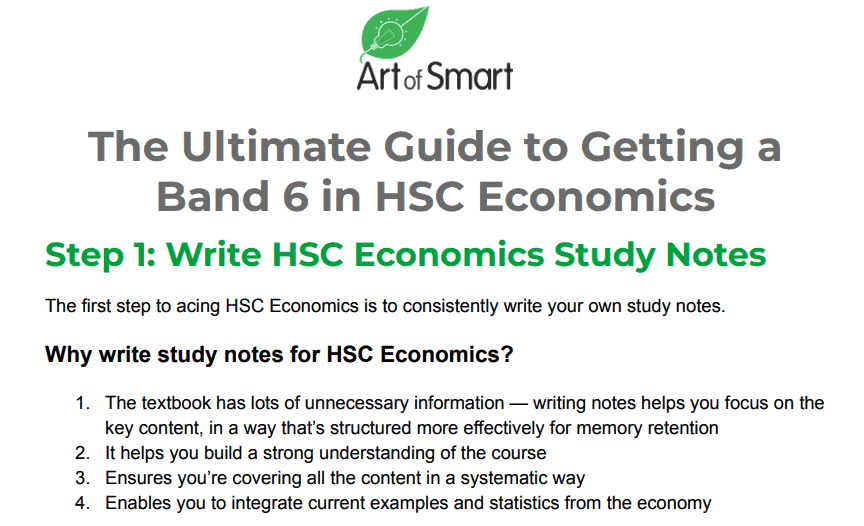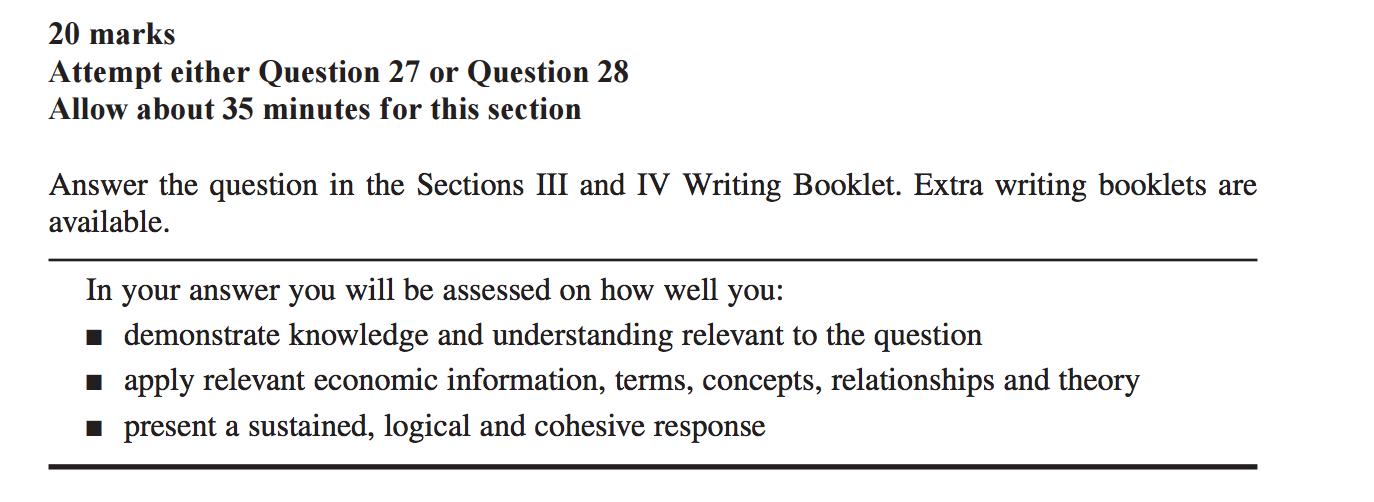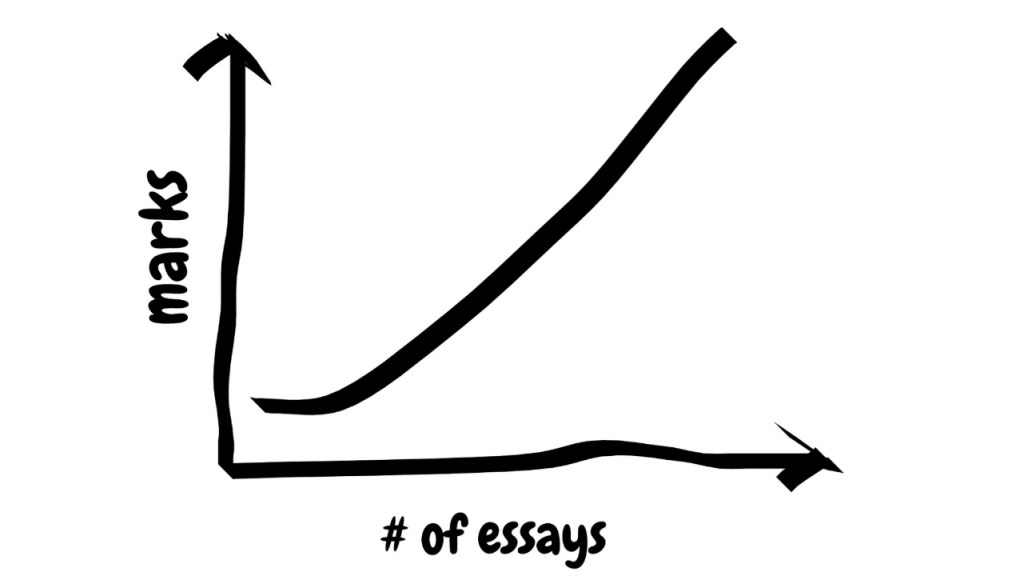Learning the HSC Economics syllabus can be tough — there’s so much theory to learn, all these statistics and economic policies to memorise and include in your HSC Economics study notes, and they’re always changing!
But we’ll let you in on a little secret — scoring a Band 6 is way easier if you follow 7 specific steps.
We’ve based these steps on over 8 years of research with over 2000+ students who scored 98+ ATARs and 10 years of experience tutoring HSC Economics.
So, what are you waiting for? It’s time to set yourself up to become a high-flying banker!
Step 1: Stay on Top of Your HSC Economics Study Notes
Step 2: Work One Week Ahead
Step 3: Stay Up to Date with the Economy
Step 4: Integrate Case Studies and Statistics Into Your Notes
Step 5: Convert the Syllabus into Short Answer Questions
Step 6: Write Practice Essays
Step 7: Teach Weekly
Step 1: Stay on Top of Your HSC Economics Study Notes
Why write study notes for HSC Economics?
- The textbook has lots of unnecessary information — writing notes helps you focus on the key content, in a way that’s structured more effectively for memory retention
- It helps you build a strong understanding of the course
- Ensures you’re covering all the content in a systematic way
- Enables you to integrate current examples and statistics from the economy
Writing Your Own Notes VS Using Another Student’s Notes
Across all the top students we’ve interviewed who aced HSC Economics (Band Sixers and State Rankers) NONE used other students’ study notes. Every single one created their own study notes.
This is so important, I’m going to repeat this. No top performing students for the HSC Economics course used other student’s study notes.
Sure, they would access them to get ideas and see how other people structured their notes and what they included in them.
But every single one of them then went away and created their own study notes.
How do you write your HSC Economics Study Notes?
We’ve written up a specific more detailed article that goes through how to create your HSC Economics study notes step by step.
Read it, print it, and follow it to create epic study notes!
Action Points:
- Write your own HSC Economics study notes
- Don’t use another student’s notes to study from
- Other students’ study notes are useful for getting inspiration only
- Follow this step by step guide here for writing your HSC Economics study notes
Step 2: Work One Week Ahead
Over the last decade, we’ve tutored and interviewed a number of state ranking HSC Economics students, including students who’ve scored 1st in NSW.
We’ve noticed one thing that all HSC Economics state rankers have in common:
They would work (at least) one week ahead of their class at school.
So for example, if their class was covering the topic, Australia’s Place in the Global Economy, syllabus dot point, Trends in Australia’s Trade Patterns, they would have covered it the week before.
In their own time. they’d be working on the next syllabus dot point to come, Trends in Financial Flows — Debt & Equity.
Why work one week ahead?
Studying the HSC Economics syllabus one week ahead of your class is a super powerful strategy for 3 reasons that have to do with memory retention and comprehension.
Reason #1: You Teach Yourself Content
When you stay 1 week ahead, you have to teach yourself content.
Generally speaking, when you teach yourself something (because you’ve had to really focus and put in more mental effort) you remember the material better.
Want to stay ahead and teach yourself upcoming topics? Check out our HSC Economics Study Notes and Videos page!
Reason #2: Good for Memory Retention
Secondly, working ahead gives you more levels of repetition (which is a key building block of memory).
You’ll hear the same content repeated in class, and then you’ll also complete any homework questions your teacher gives you, which means you’re getting an extra level of repetition.
Reason #3: Room for Questions
Finally, covering the material before you cover it in class means that in class you can really ask specific questions to really clarify your knowledge about the material, instead of asking really basic ones that the textbook likely covers.
How do you work one week ahead?
You might be thinking right now — okay, I’m convinced there’s lots of benefits in going 1 week ahead BUT… I’m struggling to keep up with all my study as it is right now.
How can you realistically work one week ahead?
The good news is that working one week ahead isn’t actually all that difficult! But it does require some planning! Here’s what we recommend:
- Print out the HSC Economics syllabus
- Identify which topic is going to be covered for each term – mark this down on the syllabus
- For each syllabus dot point in that term, identify the week you’re going to cover it in (e.g. Week 1, Week 2, Week 3 etc)
- Start covering the first syllabus dot points for that topic in the school holidays, the week before the term begins
That’s it! It’s that simple!
The key is using your last week of school holidays (for any holiday period) effectively to start getting ahead and covering what your class will cover Week 1 of that term.
Alternatively, you can also join an Art of Smart Economics Tutoring class at our Hornsby Tutoring campus, Castle Hill Tutoring or Online! Our classes for Economics move 1-2 weeks ahead of what you’re learning at school to make it easier for you to get ahead!
What if you’re reading this mid-term and want to get ahead?
The simplest way to get ahead if you’re in this position is to follow steps 1-3 above, and then cover 2 weeks worth of syllabus content (based on your term plan in Step 3) this week.
Yes, it means more work — but the good news is that it’s limited to 1 week of intense, hard work. Then you’re 1 week ahead and cruising.
So, to wrap all those steps up, let’s take a look at the action points:
Action Points:
- Make a commitment to go 1 week ahead of your class in the HSC Economics course
- Download and print out the HSC Economics syllabus
- Go through the syllabus and map out which content will be covered in which weeks of each school term
- If it’s the school holidays, use this time to cover the first week of content before school starts so you get ahead
- If it’s mid-term, cover two weeks of content in 1 week and then follow the weekly plan
Step 3: Stay Up to Date with the Economy
Simply knowing the content for the HSC Economics course won’t get you a Band 6. It might get you a low Band 5… if you’re lucky.
What distinguishes a Band 6 (and State Ranker) HSC Economics student from the other 6,000 students who sit the course each year, is the degree to which:
- You are familiar with what’s happening in the Australian and global economy
- Your ability to apply it as examples to support economic theory
Reason #1: In an exam paper, 10-15% of the questions are going to be ‘outliers’ that require deeper understanding
These are unexpected questions that don’t necessarily fit the typical mould that require an in-depth understanding as opposed to rote memorising of the content.
It’s also these questions that top performing students get correct, thanks to staying up to date with the economy.
Reason #2: Showing that you’re up to date and intimately understand the economy is something the HSC markers look for
On the HSC Exam papers, at the top of each section it provides the ‘Marking Guidelines.’
Most students skip over these to get to the question, but they’re actually really important.
Why?
Because it’s where NESA is telling you what you need to do to score top marks!
See this example here:
You’ll note that it specifically states: “apply relevant economic information, terms, concepts, relationships and theory”.
This means USE LOTS OF ECONOMIC DATA!
If you don’t use economic data — you’ve pretty much capped your essay at a Band 5 (maximum!). To get the Band 6, you need to stay up to date with the Australian and global economy.
How do you stay on top of the changing economy?
Tip #1: Spend 30 Minutes Each Week Reading the News over Breakfast
So how can you stay up to date with the economy each week?
You need to dedicate some specific time each week, although it can easily be done in down time that you have so it doesn’t feel like ‘study’.
A simple way to do is to make it part of a Saturday or Sunday breakfast routine (or every morning’s breakfast routine if you’re super motivated!)
Here are some TV programs and news outlets you can watch and read to keep up to date on current economic affairs this year!
When I was doing my HSC, I made it part of my Saturday morning breakfast routine. I’d pull out the weekend paper, and look through any article that appeared to be about the economy.
I’d read it with a pen in hand, highlighting any relevant sections. I’d then also jot down what part of the HSC syllabus it related to.
Usually I’d find 2 articles that were relevant — all in simply 30 minutes of reading time while I ate breakfast. Simple and easy!
Tip #2: Read the RBA’s Monthly Minutes
Every month the RBA meets to make a decision on monetary policy.
In the following days they then publish a comprehensive set of minutes from their meeting with their rationale for the cash rate decision.
In this rationale, they include A LOT of information about the current state of the domestic and global economy.
That means reading through them is a fantastic way to get monthly up to date statistics and trends in the quickest amount of reading time possible!
Tip #3: Watch Our Monthly HSC Economics Review Videos
Each month our HSC Economics teaching team at Art of Smart Education shoot a talk-show called the HSC Economics Review (#HER).
Here, we discuss the latest updates in the global and domestic economy and deep dive into why these changes have occurred while analysing the impact of on Australia.
This analysis is key for your essays to score a Band 6, so watching these videos is a fantastic way to level up your critical analysis in your Economics essays.
Tip #4: Use Evernote to Capture & Organise the Articles
A great way to digitally store the articles, highlights and notes you’ve made from reading news article, RBA minutes, or our HSC Economics Review videos is to use Evernote.
Evernote is a great app that works on all devices that enables you to take a picture of an article.
It then converts the picture into a text article which you can then tag/categories and it stores it in the cloud for you to access later.
What’s brilliant is that you can categorise and tag the article based on what part of the HSC Economics course you think it relates to.
THEN, when it comes to creating your HSC Economics study notes, or studying for your exams, it’s super easy to search and find relevant articles with statistics and examples you can use for specific syllabus dot points and essay questions!
If you feel like this is all too much work, the good news is that we can help you with our HSC Economics Tutoring Sydney classes. Each week our experienced HSC Economics teachers will provide you with the key statistics update so you get all the key stats in one place so you can stay up to date and ace your essays!
Action Points:
- Spend 30 minutes reading the news x 1 per week over breakfast
- Watch our HSC Economics Review videos once per month
- Download Evernote onto your phone and take picture/web clip relevant articles with economic data and case studies
Step 4: Integrate Case Studies and Statistics Into Your Study Notes
Want to score over 95% and get a state rank in HSC Economics?
Then you absolutely need to integrate real world case studies and statistics from the economy into your study notes!
What is the strategy?
Every HSC student (especially prior to Trials and HSC when motivation kicks in!) with some time can learn the economic theory. After all, it’s in the textbook, and covered in class.
Therefore, as we’ve already noted, to really stand out, you need to show that you not only understand the economic theory, but you can APPLY IT TO THE ECONOMY as well.
This is a lot harder, given that the economy is always changing!
And this is why it’s what will distinguish you from scoring a Band 5/6 and achieving a State Rank.
How can you do this?
The best way to do this is by actively integrating real world examples, case studies and statistics into your HSC Economics study notes in an intentional, planned and strategic way.
Why?
Sure, if you follow Step 3 and stay up to date with the news, you’ll have a solid understanding of what’s going on in the economy.
BUT whilst under pressure in exams, you’ll need to remember the statistics, examples and identify which is the best one to use.
This can be difficult and often doesn’t result in THE BEST EXAMPLES being used for each part of the HSC course.
That’s why, if you take the time to update your notes every now and then by integrating real world examples, case studies and statistics you find, you’ll be intentionally selecting the best examples for each part of the course!
It also means that every time you study your notes, you’re also refreshing your memory of real world examples and statistics! So it’s got a double-win!
What does it look like?
It’s really quite simple.
At the bottom of your notes for a specific syllabus dot point include a new sub-heading as follows:
Economy Case Studies & Statistics
- And then in dot points underneath, include all the relevant examples and statistics you can use for this syllabus dot point that you’ve collected from your reading of the news!
- But don’t just stop here — also include some analysis on this case study or example.
- Are there any limitations, conflicts with other objectives, or more effective policies etc that could be used?
- Make a note of this, because it’s this critical judgement about the economy that’s going to get you the extra marks!
Action Points:
- As you complete writing your notes for each syllabus dot point, include relevant examples, statistics and case studies from the economy + analysis
- Update these throughout the year as you find more examples and statistics
Step 5: Convert the HSC Economics Syllabus into Short Answer Questions
How long are your study notes? 40 pages? 50 pages? 70 pages? Do they feel like a mini-textbook?
Often when writing your study notes, it can be hard to work out what is important and needs to go into your notes, and what is additional/irrelevant material.
That’s why Step 5 is so important!
How does it work?
Take your syllabus dot point — for example:
- “Trends in Australia’s Trade Patterns”
Add a verb at the beginning and a question mark at the end and you can turn this into a short answer question:
“What are the trends in Australia’s trade patterns, and why have they changed over time?”
Once you’ve got this question, you can now use your study notes that you’ve written to write a response to this question.
Why does it work?
By having to respond to a mock HSC style question using your study notes, it forces you to consider what is actually important and helps you to evaluate the quality of your study notes.
- Do you have the required information to answer the question?
- Have you missed anything?
- Have you got too much information?
- Can you cut irrelevant things out of your notes?
The 2 Secret Bonus Benefits
There are also two additional very powerful reasons why you want to do this.
Benefit #1: You apply your knowledge
You write model answers to common questions for every single HSC dot point.
This means that you’re practising applying your knowledge to questions and every time you then review your study notes, you are actually also reviewing model answers to questions!
Benefit #2: You’re completing practice questions
As the year passes and you complete mock HSC style short answer questions for every syllabus dot point, you are also completing past HSC papers one question at a time.
So by the time HSC Trials and exams come around, without even realising it, you’ve likely completed 4-5 past papers worth of short answer questions!
When should you complete the short answer questions?
Don’t wait until your assessment or exam is around the corner! By then it will be too late and you’ll feel that the task is simply too overwhelming to complete.
Instead, each week during the term as you complete a dot point of the course in class, work on your short answer question then.
This way, you’re tackling the unit in small chunks, and by the time you’ve arrived at your assessments and exams, you’ve already been doing lots of exam practice!
Action Points:
- As you complete your study notes for a HSC Economics syllabus dot point, turn it into a mock HSC style short answer question
- Use your study notes to create a model response to the question
- Use the model response to cut/add/improve your study notes
- Integrate the model answer into your study notes
- When studying and revising your notes, review the model answer each time as well!
Step 6: Write Practice Essays
Do you write practice essays for HSC Economics?
A key difference between a Band Sixer and a State Ranker is the number of practice essays they wrote throughout the year.
In fact, from 10 years of tutoring experience with HSC Economics, I can confidently say the following rule is true: the number of practice essays you write is directly proportional to your final result.
Why is this true?
Writing essays is a great way to achieve a couple of goals at the same time.
Reason #1: 40 marks out of 100 in your HSC Trials and Exams are essays
40% of your total HSC Trials and HSC marks are essays. So it pays to be able to write killer essays as they are going to have a big impact on your marks.
They are also the place where students differentiate themselves from their peers to stand out and score a Band 6.
Overall, students will generally pick up fairly solid marks on multiple choice and short answer sections, but struggle to really get marks above 16/20 for essays.
So it’s where you can really be ahead of the pack!
Feeling motivated to get a head start? Here’s our Complete List of HSC Economics Essay Practise Questions for you!
Reason #2: Writing practice essays helps with short answers
Think about it, each paragraph in an essay is essentially a short answer response.
So by working on an essay, you’re actually killing two birds with one stone by also getting some short answer practice in for HSC Economics.
Win-win!
Reason #3: It helps you draw connections between topics
When you get taught HSC Economics in school, everything is taught, ‘ceteris paribus’ which means ‘all other things remain equal’.
This basically means you get taught concepts and ideas in isolation — so you’ll learn about economic growth separately to inflation.
The idea behind this is that it makes it easier for you to understand how each concept works.
The challenge however, is that in your assessments and exams, you’ll be asked to explore the connections between different ideas in the course.
If you’ve only focused on multiple choice and short answer questions, you won’t have developed this skill to be able to synthesise concepts across the entire course.
So writing essays during the year is critical for helping you build this skill!
Reason #4: It helps build your memory and understanding
Writing essays and having to go into more depth about specific topics is a great way to revise the content.
You have to include definitions, theory, diagrams, statistics, trends and analysis in essays.
So, by writing these essays, you’re building up your memory and understanding across all key areas of the course.
If you’re looking for a tutor to review your work and make sure you’re on the right track, our Blacktown tutors are here to help!
How many essays should you write?
As the year progresses, you want to get strong coverage with your essays over the entire course.
We recommend that you write 2 essays per topic, with a total of 8 essays. That’s 2 per term, or roughly 1 every 5 or so weeks. So it’s super achievable!
What topics essays do we recommend?
| Topic | Suggested Essay Focus |
|---|---|
| The Global Economy | - Case Study - Protection and Global Trade |
| Australia’s Place in the Global Economy | - CAD - Exchange Rates |
| Economic Issues | - Environment - Income Distribution |
| Economic Policies | - Macroeconomic Policy (Fiscal + Monetary) and its impact on Economic Growth, Unemployment and Inflation - Microeconomic Policy with the Labour Market |
How do you write a killer Band 6 HSC Economics essay?
We’ve written a comprehensive step by step article that shows you exactly how to write a Band 6 HSC Economics Essay that will impress your exam markers!
Action Points:
- The number of practice essays you write is directly proportionate to your marks at the end of Year 12
- The goal is to write 8 essays during the year leading up to HSC Trials — 2 per topic
- This works out at roughly 1 essay every 5 weeks of school term, or 2 per school term
Wanting feedback on your essays so you can ace your final HSC Economics exam? Get some support from our tutors in the Hills District!
Step 7: Teach Weekly
The final step in getting that Band 6 in HSC Economics is to teach someone weekly.
What’s the rationale behind this?
Reason #1: Teaching others increases your feedback loop
Ultimately the best way to improve is to get more feedback.
Quite often, the first time students receive feedback is when they get their exam or assessment results back.
This is the WORST time to get feedback because you can’t change it!
If you could have received this feedback BEFORE the exam however, you could have changed the outcome.
When you teach someone, you get immediate feedback on how you are going — whether you’re right, or whether you could improve your answer.
So by teaching someone each week, you can identify your weak areas and focus on them to ensure you develop your understanding by the time exams come around!
Reason #2: It builds your memory
Teaching someone else has multiple levels of repetition.
You read your notes, communicate the key ideas, the person asks questions and you reply.
This has at least 4 levels of repetition. Compare this to reading your textbook which has 1-2 levels of repetition.
Ultimately, memory building is about repetition — and the more levels of repetition you can fit in the same amount of time, the better!
Reason #3: It enhances your analysis
Finally, teaching someone else enhances your analysis!
This is because they will ask you questions, which forces you to think more about the connections that exist in the economic course.
You’ll also often find yourself getting into discussions and debates about whether the RBA will drop the cash rate, or whether the budget is effective, or if our unemployment rate is actually an issue.
This debate is critical, because you’re essentially developing your analysis here that you can use in your essays!
Keen to add more depth to your responses? Here are the 4 Economists you should know for the HSC to score a Band 6!
How can you implement teaching others into your routine?
There’s three simple options you can use to teach others.
Tip #1: Teach your family over breakfast as you read your news articles
So given that you’re going to be reading the paper each weekend at breakfast, looking at the key economics news, use this as an opportunity to teach.
Explain to your family the key points in the article, and what the impact will be for the Australian economy.
This is an easy way to integrate this into your week without it taking up additional time.
Tip #2: Form a study group
Find 1-2 friends who you are studying HSC Economics with and schedule in a weekly time (either during a free period or after school), where you can sit down and teach each other.
Each week, pull out the syllabus for what you have been doing at school.
Then, identify the hardest parts that you are all having difficulty with and try to quiz then teach each other the content.
Additionally, you can also work on the short answer questions together.
This will enable you to complete quicker, and to a higher quality as you are tapping into 3 brains instead of just yours!
Tip #3: Volunteer to help peers in your class at school
Let your teacher know that you are available to help any students in your class who might need some extra support via peer tutoring.
This way, if anyone needs help, you can be the go to person to help them.
You might be thinking — “But I’m competing against my peers. They might get a better rank than me. Shouldn’t I focus on me rather than on helping someone else?”
Honestly, if you’re tutoring a friend, they’re likely struggling and ranking poorly, so it’s going to take a BIG improvement for them to outrank you.
Additionally, by teaching them, you’re actually doing some of the best study ever from a memory point of view so you’re going to be also advancing in big leaps!
This means you’re actually helping yourself by helping your peers!
Action Points:
- Teach your family the key concepts from the news articles you read each week over breakfast
- Form a study group with 2-3 friends so that you can increase your feedback loop and quality of your analysis
- Volunteer to peer tutor any students in your grade who are struggling
And that wraps up our definitive guide to acing HSC Economics and getting that Band 6! Good luck!
Looking for some extra help with the HSC Economics syllabus?
We pride ourselves on our inspirational HSC Economics coaches and mentors!
We offer tutoring and mentoring for Years K-12 in a variety of subjects, with personalised lessons conducted one-on-one in your home, online or at one of our state of the art campuses in Hornsby or the Hills!
To find out more and get started with an inspirational tutor and mentor get in touch today!
Give us a ring on 1300 267 888, email us at [email protected] or check us out on TikTok!













